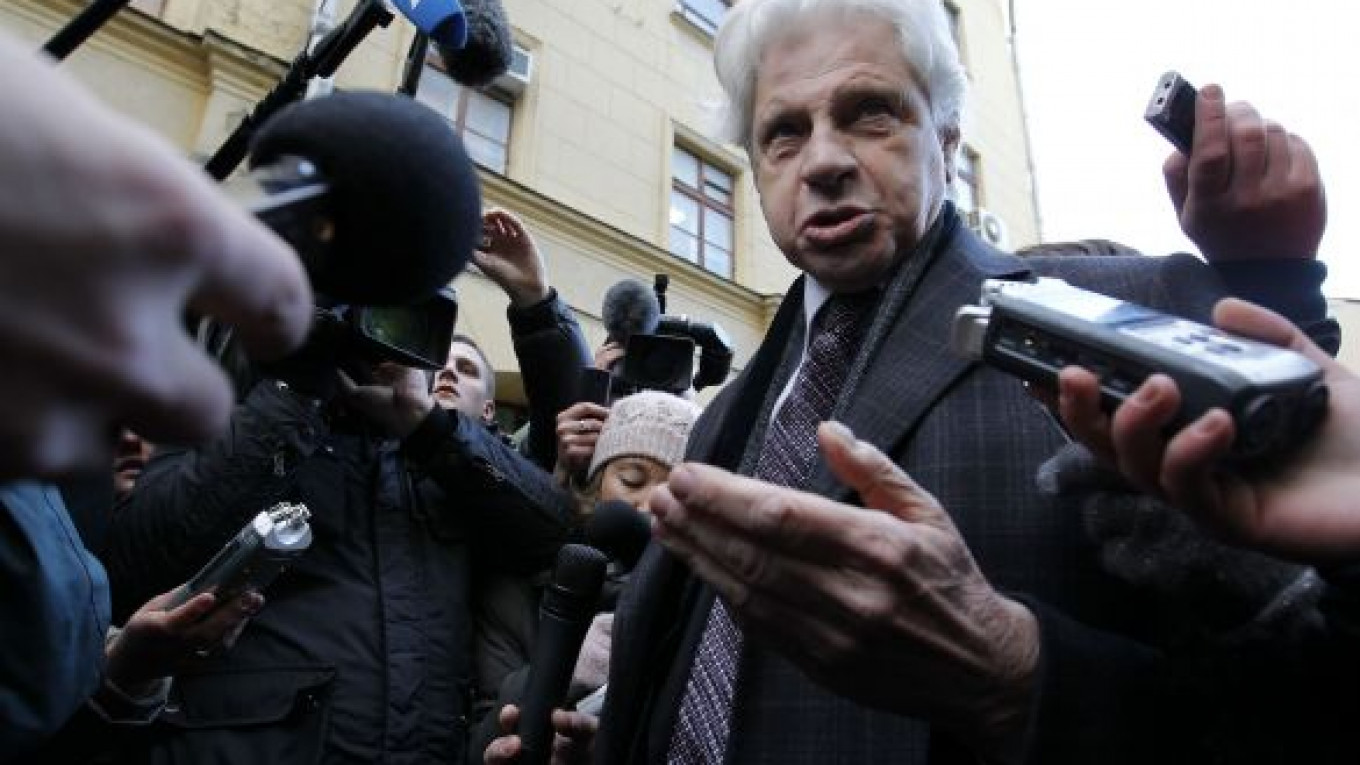It's a short walk from City Hall to the office of the Interior Ministry's Investigative Committee downtown, but for Yury Luzhkov it was a big step.
The former mayor on Tuesday underwent 4 1/2 hours of questioning as a witness in a criminal case linked to his wife, but — contrary to speculation — was not detained and left the building on his own.
Still, analysts remained split on whether it was possible for Luzhkov to peacefully end his standoff with the Kremlin, which he has accused of fabricating the case against him.
Luzhkov dodged the media on Tuesday, entering and leaving the investigator's office on Gazetny Pereulok in a car through a back entrance.
His lawyer, Genri Reznik, said his client was bound by a nondisclosure agreement and could not answer questions from the dozens of journalists waiting outside the investigator's office, Interfax reported.
Speaking on his behalf, Reznik said Luzhkov was grilled over the alleged embezzlement of 12.7 billion rubles ($413 million) of state funds in 2009 through Bank of Moscow, which was controlled by City Hall at the time.
Investigators said earlier that the money wound up in the account of Luzhkov's billionaire wife, Yelena Baturina, who is also wanted for questioning but remains abroad.
Reznik said Luzhkov answered all the investigator's questions and scoffed at speculation that the ex-mayor would become a suspect himself as "idiotic."
"This is not Luzhkov's case, this is Bank of Moscow's case, so why should he be a suspect?" he said.
Reznik, who is a well-connected powerbroker, also said Luzhkov may be offered a seat on the Federation Council, which would grant him immunity from criminal prosecution. But he later backed off the statement as a joke.
Further questioning is planned and Reznik said Luzhkov has no plans to avoid it. No dates have been set.
Luzhkov, 72, who ruled Moscow since 1992, first as elected mayor and later as a Kremlin appointee, was ousted by President Dmitry Medvedev in September 2010 over "loss of confidence."
The Kremlin did not elaborate on its reasons, but most analysts agreed that Luzhkov was sacked for publicly challenging Medvedev.
Luzhkov, who always had better ties with Prime Minister Vladimir Putin, kept a low profile last year, but has mounted an attack on Medvedev in recent months, denouncing his leadership skills in numerous interviews.
He also insisted that the Bank of Moscow case is simple retaliation against him and his family. Baturina sold her thriving real estate business after her husband's removal and moved to London with their two daughters. Luzhkov's son Alexander also sold his advertising company in August, Kommersant Tuesday.
The accusation prompted Sergei Naryshkin, head of the Kremlin administration, to break his silence on the Luzhkov issue, saying earlier this month that Moscow "suffered from enormous corruption" under the ousted mayor. Luzhkov promptly sued for defamation with a court hearing set for Nov. 28.
Luzhkov was abroad when investigators summoned him for questioning last month, but returned to Moscow despite his own speculation that the case against him was political. He said he "prohibited" Baturina from following him for fear for her safety.
Luzhkov's lashing out at the Kremlin was driven by his disappointment over his wife being pressured to sell her business, independent political analyst Stanislav Belkovsky said by telephone Tuesday.
He added that the mayor apparently saw Medvedev as a "lame duck" after the president announced in September that he would not seek re-election.
His position was echoed by Vladimir Pribylovsky, head of the Panorama think tank, who said Kremlin-connected business groups are still looking to get hold of the Luzhkov family's assets, both domestic and abroad.
But the opponents still can negotiate a deal if Luzhkov backs down, because his Kremlin-bashing did not amount to a serious challenge, Belkovsky said.
"I understand that everyone is bored without political struggle, but Luzhkov's comments don't qualify as one," he said.
Pribylovsky said a serious attack on Luzhkov, a longtime insider in the corridors of power, may have unwanted consequences for the ruling elite.
"He is still powerful and may say a lot if he starts to speak," Pribylovsky said. He added that an attack on Luzhkov puts Putin in a negative light because "he ruled during Putin's tenure."
But Yaroslav Nilov, a State Duma deputy with the Liberal Democratic Party, said Luzhkov has gone too far to get any deals.
"Measures were taken against him after he started claiming that he's an honest and innocent man," Nilov said in reference to the Bank of Moscow case. "Had he kept silent, he might have been sitting in the Federation Council by now."
A Message from The Moscow Times:
Dear readers,
We are facing unprecedented challenges. Russia's Prosecutor General's Office has designated The Moscow Times as an "undesirable" organization, criminalizing our work and putting our staff at risk of prosecution. This follows our earlier unjust labeling as a "foreign agent."
These actions are direct attempts to silence independent journalism in Russia. The authorities claim our work "discredits the decisions of the Russian leadership." We see things differently: we strive to provide accurate, unbiased reporting on Russia.
We, the journalists of The Moscow Times, refuse to be silenced. But to continue our work, we need your help.
Your support, no matter how small, makes a world of difference. If you can, please support us monthly starting from just $2. It's quick to set up, and every contribution makes a significant impact.
By supporting The Moscow Times, you're defending open, independent journalism in the face of repression. Thank you for standing with us.
Remind me later.






